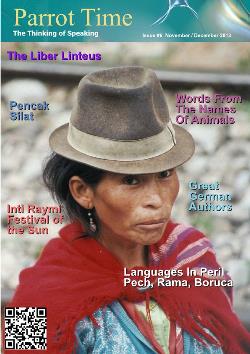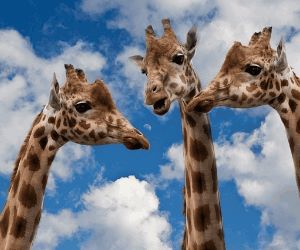Revisited
Words From The Names Of Animals

|
Other names of birds not quite so common used to describe stupid people are dotterel and dodo. The dotterel is a bird which is very easily caught, and it was from this fact that it got its name, which comes from dote, to be "silly" or "feeble-minded." When the name of the bird is used to describe a silly person, the word is really, as an interesting writer on the history of words says, turning "a complete somersault." The same is the case with dodo, which is also used, but not so often, to describe a stupid person. This bird also got its name from a word which meant "foolish." It comes from the Portuguese word doudo, which means "simpleton." We have a few verbs also taken from the names of animals and birds. We say a person "apes" another when he tries to imitate him. This word comes, of course, from the fact that the ape is always imitating any action performed by other people. 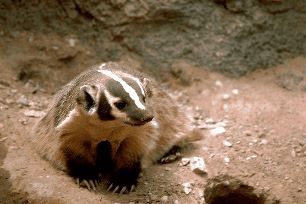 A quiet badger, not bothering anyone A person who follows another persistently is said to "dog" his steps. This expression comes, of course, from the fact of dogs following their masters. Another expression is to "hound" a person to do something, by which we mean persecute him. This comes from the idea of a hound tracking its victim down. Another of these words which has the idea of persecution is badger. When some one constantly talks about a subject which is unpleasant to another, or continually tries to persuade him to do something against his will, he is said to be "badgering" him. The badger is an animal which burrows into the ground in winter, and dogs are set to worry it out of its hiding-place. The badger is the victim and not the persecutor, as we might think from the use of the verb. The verb henpeck, to describe the teasing of her husband by a disagreeable wife, comes, of course, from the idea of the continual pecking of a hen. Many common articles are named after animals which they resemble in some way. A "ram" is an instrument, generally of wood, used to drive things into place by pressure. In olden days war-ships used to have a "battering-ram," or projecting beak, at their prow, with which to "ram" other vessels. The Romans called such a beak an aries, which is the Latin for "ram," a male sheep. This was probably from the habit of rams butting an enemy with their horns. The Romans often had the ends of their battering-rams carved into the shape of the head of a ram. A "ramrod" gets its name from the same idea. It is an instrument for pressing in the ammunition when loading the muzzle of a gun. 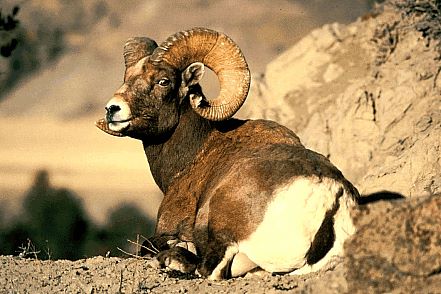 The pushy ram, who likes to butt heads The word "ram" has now several more general uses. We speak of a person "ramming" things into a drawer or bag when we mean pushing them hastily and untidily into too small a place. Or a man may "ram" his hat down on his head. Again, we may have a lesson or unpleasant fact "rammed" into us by some one who is determined to make the subject clear whether we want to hear about it or not. And all this comes from the simple idea of the ram butting people whom it considers unpleasant. More commonplace instruments having animals' names are the "clothes'-horse" and "fire-dogs." We have other words, which we should not guess to be from animals' names, but which really are so. We say that a person who is always changing his mind, and wanting first one thing and then another, is "capricious." Or we speak of a curious or unreasonable desire as a "caprice." These words really come from the Latin name for a goat--caper. The mind of the capricious person skips about just like a goat. At least that is what the word capricious literally says about him. The word caper, meaning to "jump about playing tricks," comes from the Latin word capra, a "she-goat." 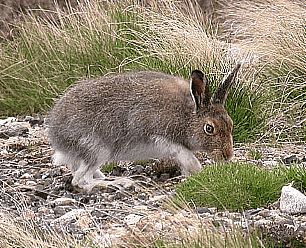 A hare, which we consider to be cowardly The word coward comes from the name of an animal, but not the cow. In a famous French story of the Middle Ages, in which all the characters are animals, the "Roman de Renard," the hare is called couard, and it is from this that the word coward ("one who runs away from danger") comes. All these words from the names of animals take us back, then, to the days when every man was a kind of naturalist. In those early days, when town life hardly existed, everybody knew all about animals and their habits. Their conversation was full of this sort of thing. And so it is that in hundreds of our words which we use to-day, without thinking of the literal meaning at all, we have a picture of the lives of our ancestors preserved. We have, too, words taken from the names of some animals which never existed at all. The writers of the Middle Ages told many tales or fables of animals and monsters which were purely imaginary, but in which the people of those days firmly believed. We sometimes hear people use the expression a "basilisk glare," which other people would describe as a "look that kills," meaning a look of great severity or displeasure. There is a little American lizard which zoologists call the "basilisk," but this is not the basilisk from which this expression comes. The basilisk which the people of the Middle Ages imagined, but which never existed, was a monstrous reptile hatched by a serpent from a cock's egg. By its breath or even its look it could destroy all who approached it. Another invention of the Middle Ages was the bird called the "phoenix." We now use the word phoenix to describe some one who is unique in some good quality. A commoner way of expressing the same idea would be that "there is no one like him." It was believed in the Middle Ages that only one of these wonderful birds could exist in the world at one time. The story was that the phoenix, after living through five or six hundred years in the Arabian desert, prepared a funeral pile for itself, and was burned to death, but rose again, youthful and strong as ever, from the ashes. In these words we are reminded once again of another side of the life of our ancestors. |
| Revisited - Words From The Names Of Animals | ||||
| Writer: | Elizabeth O'Neill | |||
| Images: | ||||
| ||||
| Sources: | ||||
| ||||
All images are Copyright - CC BY-SA (Creative Commons Share Alike) by their respective owners, except for Petey, which is Public Domain (PD) or unless otherwise noted.
comments powered by Disqus












